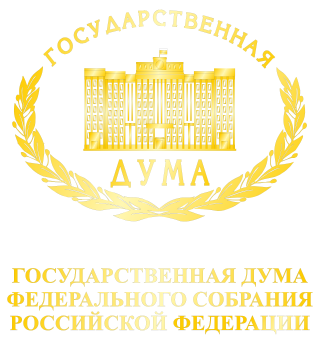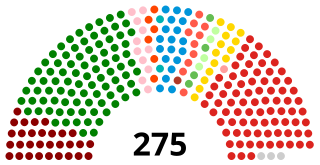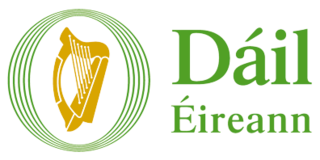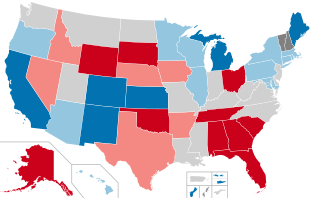| ||||||||||||||||||||||
| Results | ||||||||||||||||||||||
|---|---|---|---|---|---|---|---|---|---|---|---|---|---|---|---|---|---|---|---|---|---|---|
| ||||||||||||||||||||||
 |
|---|
A referendum on a new constitution was held in Liberia on 3 July 1984. It was approved by 99% of voters, with a turnout of 82%. [1] The new constitution came into force on 6 January 1986, following the 1985 general elections.
| ||||||||||||||||||||||
| Results | ||||||||||||||||||||||
|---|---|---|---|---|---|---|---|---|---|---|---|---|---|---|---|---|---|---|---|---|---|---|
| ||||||||||||||||||||||
 |
|---|
A referendum on a new constitution was held in Liberia on 3 July 1984. It was approved by 99% of voters, with a turnout of 82%. [1] The new constitution came into force on 6 January 1986, following the 1985 general elections.
| Choice | Votes | % | |
|---|---|---|---|
| For | 540,113 | 98.58 | |
| Against | 7,771 | 1.42 | |
| Total | 547,884 | 100.00 | |
| Valid votes | 547,884 | 96.65 | |
| Invalid/blank votes | 19,007 | 3.35 | |
| Total votes | 566,891 | 100.00 | |
| Registered voters/turnout | 689,929 | 82.17 | |
| Source: Nohlen et al. | |||

The Constitution Party, formerly the U.S. Taxpayers' Party until 1999, is a political party in the United States that promotes a religious conservative view of the principles and intents of the United States Constitution. The party platform is based on originalist interpretations of the Constitution and shaped by principles which it believes were set forth in the Declaration of Independence, the Bill of Rights, the Constitution and the Bible.

The 1788–1789 United States presidential election was the first quadrennial presidential election. It was held from Monday, December 15, 1788, to Saturday, January 10, 1789, under the new Constitution ratified that same year. George Washington was unanimously elected for the first of his two terms as president and John Adams became the first vice president. This was the only U.S. presidential election that spanned two calendar years without a contingent election and the first national presidential election in American history.
An electoral college is a set of electors who are selected to elect a candidate to particular offices. Often these represent different organizations, political parties or entities, with each organization, political party or entity represented by a particular number of electors or with votes weighted in a particular way.

The president of India is the head of state of the Republic of India. The president is the nominal head of the executive, the first citizen of the country, as well as the commander-in-chief of the Indian Armed Forces. Droupadi Murmu is the 15th and current president, having taken office from 25 July 2022.

The president of South Africa is the head of state and head of government of the Republic of South Africa. The president heads the executive branch of the Government of South Africa and is the commander-in-chief of the South African National Defence Force. Between 1961 and 1994, the office of head of state was the state presidency.

The Islamic Consultative Assembly, also called the Iranian Parliament, the Iranian Majles or ICA, is the national legislative body of Iran. The Parliament currently consists of 290 representatives, an increase from the previous 272 seats since the 18 February 2000 election. The most recent election took place on 21 February 2020, and the new parliament convened on 28 May 2020.

The President of Pakistan, officially the President of the Islamic Republic of Pakistan, is the ceremonial head of state of Pakistan and the commander-in-chief of the Pakistan Armed Forces.

The New Jersey Legislature is the legislative branch of the government of the U.S. state of New Jersey. In its current form, as defined by the New Jersey Constitution of 1947, the Legislature consists of two houses: the General Assembly and the Senate. The Legislature meets in the New Jersey State House, in the state capital of Trenton.

The vice president of India is the deputy to the head of state of the Republic of India, i.e. the president of India. The office of vice president is the second-highest constitutional office after the president and ranks second in the order of precedence and first in the line of succession to the presidency. The vice president is also the ex officio chairman of the Rajya Sabha.

The Tennessee General Assembly (TNGA) is the state legislature of the U.S. state of Tennessee. It is a part-time bicameral legislature consisting of a Senate and a House of Representatives. The Speaker of the Senate carries the additional title and office of Lieutenant Governor of Tennessee. In addition to passing a budget for state government plus other legislation, the General Assembly appoints three state officers specified by the state constitution. It is also the initiating body in any process to amend the state's constitution.

The State Duma, commonly abbreviated in Russian as Gosduma, is the lower house of the Federal Assembly of Russia, while the upper house is the Federation Council. The Duma headquarters are located in central Moscow, a few steps from Manege Square. Its members are referred to as deputies. The State Duma replaced the Supreme Soviet as a result of the new constitution introduced by Boris Yeltsin in the aftermath of the Russian constitutional crisis of 1993, and approved in a nationwide referendum.

The House of Representatives, or Pratinidhi Sabha, is the one of the houses of the Federal Parliament of Nepal, with the other house being the National Assembly. Members of the House of Representatives are elected through a parallel voting system. They hold their seats for five years or until the body is dissolved by the President on the advice of the council of ministers. The house meets at the International Convention Centre in Kathmandu.

The New Hampshire Senate is the upper house of the New Hampshire General Court, alongside the lower New Hampshire House of Representatives. The Senate has been meeting since 1784. The Senate consists of 24 members representing Senate districts based on population. As of December 7, 2022 there are 14 Republicans and 10 Democrats.

Elections in New Jersey are authorized under Article II of the New Jersey State Constitution, which establishes elections for the governor, the lieutenant governor, and members of the New Jersey Legislature. Elections are regulated under state law, Title 19. The office of the New Jersey Secretary of State has a Division of Elections that oversees the execution of elections under state law. In addition, the New Jersey Election Law Enforcement Commission (ELEC) is responsible for administering campaign financing and lobbying disclosure.

In the United States, a state is a constituent political entity, of which there are 50. Bound together in a political union, each state holds governmental jurisdiction over a separate and defined geographic territory where it shares its sovereignty with the federal government. Due to this shared sovereignty, Americans are citizens both of the federal republic and of the state in which they reside. State citizenship and residency are flexible, and no government approval is required to move between states, except for persons restricted by certain types of court orders.

Dáil Éireann is the lower house, and principal chamber, of the Oireachtas, which also includes the President of Ireland and Seanad Éireann. It consists of 160 members, each known as a Teachta Dála. TDs represent 39 constituencies and are directly elected for terms not exceeding five years, on the system of proportional representation by means of the single transferable vote (PR-STV). Its powers are similar to those of lower houses under many other bicameral parliamentary systems and it is by far the dominant branch of the Oireachtas. Subject to the limits imposed by the Constitution of Ireland, it has power to pass any law it wishes, and to nominate and remove the Taoiseach. Since 1922, it has met in Leinster House in Dublin.

United States gubernatorial elections are scheduled to be held on November 3, 2026, in 36 states and three territories. The previous gubernatorial elections for this group of states took place in 2022, except in New Hampshire and Vermont, where governors serve two-year terms and will elect their governors in 2024.